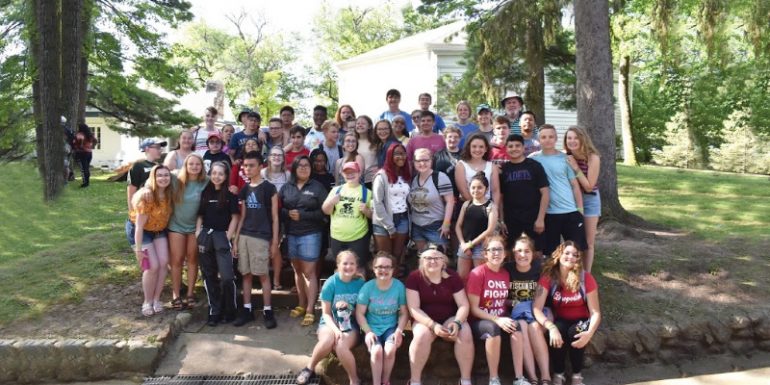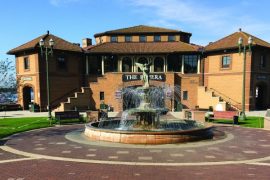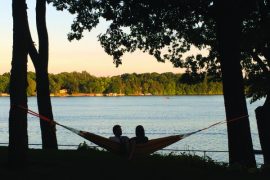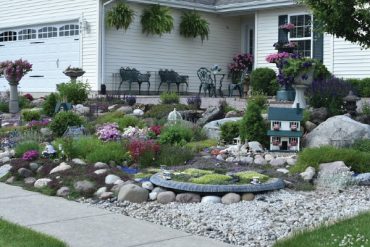By Lisa Schmelz
Like a lot of kids, Jeremiah Shell was hoping he would still get to go to summer camp this year. Working on his math at the family dining room table in Joliet, Illinois, in early April, he was anxious to find out if COVID-19 restrictions would be lifted enough for him to once again make his way to Camp One Step on the shores of Geneva Lake.
Asked what the first word that comes to mind is when he hears “Camp One Step,” his reply is simple: “Friendship.”
“I play games with my friends,” says Jeremiah. “We love to play games with each other like gaga ball or kickball. I like to swim with my friends. Oh, and I like the bacon there. They have the best chefs at camp. The food is really good.”
Sadly, just before this publication went to press, Jeremiah learned there would be no camp this summer. For Camp One Step, the considerations for hosting its many programs came with bigger risk factors: All of its campers have a shared connection—cancer. Opening during a global pandemic, to medically compromised campers, just wasn’t possible this season. But virtual camping experiences will be offered for them to continue, in some way, to experience the community that is camp.
Since 1978, Children’s Oncology Services — an educational and recreational non-profit serving the needs of pediatric cancer patients — has been operating a camp each summer on Geneva Lake. For 35 years, they occupied seasonal space at George Williams College. Since 2013, they’ve held summer camps at Conference Point. Always, the aim is the same. To provide a free camp experience to pediatric cancer patients, their siblings and families from June through August.
“We have a mix of kids,” explains Susie Burke, a pediatric nurse practitioner and the camp’s medical director. “We have many kids who have finished treatment and may now be living with survivorship issues. About two-thirds to three-fourths of children who undergo cancer treatments develop lifelong side effects.
Some are visible and some are not. We also have some kids at camp who are still undergoing treatment.”
This would have been Jeremiah’s fifth season at Camp One Step. Diagnosed on April 9, 2010, with T-cell acute lymphoblastic leukemia, he went from being an active 3 1⁄2-year-old to a seriously ill toddler. The battle to save his life was fought hard, and treatments were carried out for over three years. When an art therapist working with Jeremiah and his family encouraged them to attend Camp One Step, his parents, Terrell and Danielle, had no idea how life-altering it would be for all of their family. Today, camp is their second family. The Shells have attended numerous family camp sessions in the fall. Jeremiah attends camp on his own, and has bonded with his teenage counselors, who are also cancer survivors. His sisters attend a sibling camp. It’s truly a family affair.
“We met so many beautiful families,” reflects Danielle, a tax analyst. “And it was breathtaking for parents. We were able to share with each other, as parents with children in and out of treatment. We could actually express what was in our hearts. And there was programming for the siblings and for the kids who were cancer patients, and well, they just made them feel like regular kids. They didn’t want to talk about their medications and their treatments. They just wanted to be kids.”
Making kids feel regular, while caring for their very specific medical needs, is all in a day’s work for Burke. A nurse since 1981, she’s spent decades in pediatric oncology. When she heard about Camp One Step in the early ‘80s, she realized she wanted to be a part of her patients’ lives outside of their hematology and oncology clinic visits. Today, she oversees a large volunteer medical team, who in turn oversee the unique medical needs of each camper. Camp, she says, is important medicine.
“Kids with cancer are resilient, but definitely go through a lot as they fight for their lives during treatment. Camp is transformative for them as it helps them make sense of their life and regain a sense of belonging after their cancer experience,” she says. “This is important because when a child is being treated for cancer, they often become socially isolated from their peers as their treatment takes them away from school and social events. Camp provides a new normal for the child, allows them opportunities to establish new friendships with other kids who have been through similar experiences, develop new skills, while overcoming new challenges — all in a safe, accepting environment.”
Camp isn’t just transformative for campers and families, she adds. It also feeds the souls of those who work in pediatric oncology clinics. Burn-out in the field, she says, is understandably high. But at camp, a pediatric oncology nurse gets to know the kid — not the patient.
“Last summer, I had a nurse who came and worked at camp and said, ‘If it wasn’t for camp, I would have left oncology.’ It saved her,” says Burke. “Camp saved her.”
Not every camper who comes here leaps at the invitation. But when they finally do, they don’t regret it and they often end up getting others to join in the camp’s mission. “I had a teenager I treated at Children’s [Hospital], and for years I tried to convince her to go to camp,” says Burke. “I think we did this about four years in a row. She always said no. But she finally decided on her own when she was ready. And then after she went, she said something like ‘I didn’t know it was going to be that much fun!’ She’s now a camp counselor and has been a counselor with us for four years and she got her sister to be a counselor, and her other sister who finished nursing school is joining our medical team. Everybody who is involved with Camp One Step really feels that connection, that close connection that comes from being a part of this.”
Those words are certainly true for Jeremiah’s family. In early April, when Danielle and Jeremiah spoke with At The Lake, they were already figuring out how to beat the COVID-19 restrictions and get some of their camp spirit back. Thanks to the power of Zoom, they held a Camp One Step family reunion.
“It went really well,” says Danielle, a few days after the online gathering. “It was great to see everyone from camp. We had six or seven families and we played Camp One Step Bingo. It was amazing. They are our second family.”
To learn more about Camp One Step and its many programs for pediatric cancer patients, their siblings and families, or to support their work, visit camponestep.org.
CAMP ONE STEP BY THE NUMBERS
0: Amount charged to campers
7-19: Ages of campers served, all of whom have experienced a recent or past diagnosis of cancer.
11: Programs throughout the Midwest, including its flagship camp on Geneva Lake
42: Years on Geneva Lake
400: Volunteers, many of whom are doctors and nurses
16,500: Campers served





